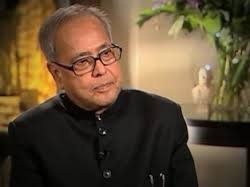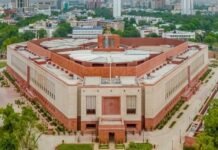New Delhi, Jan 29: President Pranab Mukherjee has sought to scotch long-standing speculation about his aspiring to become interim Prime Minister after Indira Gandhi’s assassination and termed these stories as “false and spiteful”.
In the second volume of his memoir, The Turbulent Years: 1980-96, released today by Vice President Hamid Ansari, Mukherjee says “Many stories have been circulated that I aspired to be the interim Prime Minister, that I had staked claim and had to be persuaded otherwise.
“And that this created misgivings in Rajiv Gandhi’s mind. These stories are completely false and spiteful.”
In the book published by Rupa Publications, the President has written in detail about the conversation he had with Rajiv Gandhi in a bathroom about Prime Ministership.
“Time was ticking away and I was very keen to talk to him. I went near the couple (Rajiv and Sonia) and gently touched Rajiv on the back of his shoulder to indicate that I had some very urgent work with him. He released himself from Sonia’s arms and turned around to talk to me.
“Knowing that I would not have disturbed him unless the matter was very urgent and confidential, he quickly led me to the bathroom attached to the room so that we could talk without being noticed by anyone else who may enter the room,” Mukherjee said.
The two had a discussion on the political situation then and views of partymen about appointing Rajiv as the Prime Minister, which he had agreed to become. Later, “I came out of the bathroom and conveyed Rajiv’s decision to everyone”.
Talking about circumstances that led to his ouster from Rajiv’s Cabinet and then from the party, Mukherjee admitted to “have sensed Rajiv’s growing unhappiness and the hostility of those around him and taken pre-emptive action”.
“To the question of why he dropped me from the Cabinet and expelled me from the party, all I can say is that he made mistakes and so did I. He let others influence him and listened to their calumnies against me. I let my frustration overtake my patience,” he said.
The President was forced to leave Congress in April 1986 after which he formed Rashtriya Samajwadi Congress (RSC). However, Mukherjee feels he could have avoided the RSC fiasco. “I should have the wisdom to realise that I was (and am) not a mass leader. Those who left the Congress rarely succeeded. I could have been of some help to the Congress party and the government during those crucial years of 1986 and 1987 when everything seemed to go wrong for Rajiv,” Mukherjee, who returned to Congress after two years, said.
Mukherjee said Rajiv was a “reluctant politician” who was forced by circumstances to become Prime Minister at the age of 40.
“He was ahead of his times. he wanted rapid change and saw the old guard in the Congress as an obstacle to his vision. He was forward looking, tech savvy and welcomed foreign investment in India as well as enlargement of the market economy.
“In contrast, I was a conservative, conventional political leader who favoured the public sector, a regulated economy and wanted foreign investment only from NRIs,” the President writes.
The “unconscionable” anti-Sikh riots, which broke out in the name of revenge for Indira Gandhi’s assassination, caught the Rajiv Gandhi government unprepared, he writes.
“The government was just not ready for an eventuality such as Mrs Gandhi’s assassination and the riots that followed. Every mature government has mechanisms to deal with a crisis such as this. Unfortunately, overwhelming grief overtook the nation and miscreants took advantage of the situation, causing loss of life and suffering,” Mukherjee says.




























